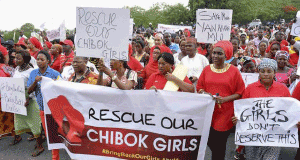Nigeria’s President and Commander-in-Chief, Goodluck Jonathan, and his security team held an extended meeting focused, largely, on the kidnapping of the Chibok girls and the bomb blast near Abuja (the latter left 20 dead).
According to Information Minister, Labaran Maku, Mr. President is promising Nigerians that “wherever the girls are in the world, we will get them back, apprehend and punish the culprits”. Also, in terms of policy execution and response, Maku added that “the president has set up a fact-finding committee…”
Seriously?
The fact is that the president means well, but can do better.
First, I think that rather than respond with a committee on the Chibok girls, terrorism and Boko Haram crisis, President Jonathan should launch Operation Iron Fist! The Commander-in-Chief of Nigeria’s armed forces should, discreetly and decisively, defang the Boko Haram gang!
Second, I think President Jonathan’s promise to get the Chibok girls back is re-assuring when juxtaposed against the reality of the present circumstances of the distraught parents of at least 276 teenagers. I also know that the warped psychology, satanist ideology, brigandage and lethal impunity of Boko Haram does not require the announcement of a presidential ‘committee’ for the verification of the enrolment list at Chibok secondary school in Borno State. No; not at this time. The Chibok girls were forcibly taken by armed members of the radical, violent Islamic, pro al-Qaeda sect known as Boko Haram on April 15, 2014.
Third, countries which have successfully confronted and defeated (not clinically eliminated) terrorism such as the U.S. and Israel do not announce committees when a bomb or hijack or kidnap occurs! You deal decisively with the beast; period! Little wonder, such expectations are common, especially for those Nigerians in the Diaspora who are familiar with the swifter responses to such incidents. Nigerians abroad and at home point harshly to the announcement that on the Chibok girls abduction, their “president has set up a fact-finding committee”. Those thoughts are across the social media.
Fourth, Boko Haram, the group of Islamic radicals and terrorists, which President Jonathan in 2013 dismissed as “ghosts”, seems more sophisticated than mechanised brigades of some standing armies. Somehow, they have made parts of Nigeria, materially, unsafe and, worse, ungovernable.
Fifth, at this time, Nigerians need much more than committees and bureaucratic meetings – especially after four bloody years of wanton violence by Boko Haram in parts of North East Nigeria and around Abuja.
Mr. President, if Boko Haram and its financiers are not defeated before the ‘ember months’ of 2014, Boko effect will impact the 2015 elections, negatively!
Sixth, at this time of transformative and violent dynamics in Nigeria’s history, we don’t need a committee to count the exact number of the kidnapped, violated Chibok girls.
Seventh, at this time of the brutal, unrelenting actions of Boko Haram, without mincing words, we don’t need a committee to count the exact number of the kidnapped who escaped. Simply, Nigerians want all the girls home!
Eighth, amid the cries of mothers everywhere to #BringOurGirlsBack, those mothers and their families need the unwavering, definably strong shoulder of the President of Nigeria; not the impersonality of a tabulating committee.
Let’s go back for some vital, historical context.
USAfrica News Index on Nigeria show that on March 5, 2013 in Kaduna, the Sultan of Sokoto, Sa’ad Abubakar III, a former soldier, asked Jonathan to immediately grant amnesty to all members of Boko Haram, as a path to ending the violence unleashed on millions of Nigerians and foreigners by the sect and its spin-offs. Permit me to note that I was acquainted with the Sultan from 1987 to 1988 while he was at the 32nd Armoured Brigade of the Nigerian Army and I was on national service at the Nigerian Army School of Education (NASE).
On September 29, 2013, in obvious exasperation, Jonathan expressed his frustration with Boko Haram during a church service at the National Christian Centre to commemorate the 53rd Independence anniversary in 2013 that: “Today, you will agree with me that if you are in my shoes you will lack the words to say anything. We had this programme in mind and when we went to bed last night and agreed that we will all gather here to thank God for what he has done for this country. Only few minutes after midnight, about 21 students were murdered by a group that called themselves Boko Haram
“If you were wearing my shoes, what comment will you have to tell Nigerians; what message will you tell the parents of these young people; our future leaders who were killed at the College of Agriculture? Can you say that the killing of these students is political? Those students belong to which political parties? Will you say it was ethnic cleansing? Those students belong to which ethnic group in Nigeria? Was it religious? Those students, were they Christians or Muslims or what? This is what we see on a daily basis. It is quite depressing…”
The USAfrica News Index on this issue and period (November 2011 to March 2013) show that Nigeria’s president initially, it seemed, strongly disagreed with the calls for amnesty for Boko Haram. On March 5, 2013, he insisted: “You cannot declare amnesty for ghosts.” He made those comments in Damaturu, the capital of Yobe State.
The embattled president argued, in contrast, that those who argue he should extend to Boko Haram a similar amnesty of financial and peace deals (his government has continued with militants from his home state and region) should note that: “In the Niger Delta, if you call them (militants), they come and tell you their grievances; but Boko Haram, I don’t see anybody who says they are Boko Haram.”
The captors of the Chibok girls reportedly came in military uniforms – a familiar tactic of the Boko Haram gunmen. USAfricaonline.com reported on October 21, 2013 that the growing concerns over security and the brazen attacks by the radical group were highlighted when Boko Haram gunmen dressed in military uniform on Sunday (October 20, 2013) killed 19 people near the town of Logumani, close to the Nigerian north-eastern border with Cameroon.
A senior national security adviser to President Jonathan indicated to USAfrica and USAfricaonline.com from Abuja on October 21, 2013 that the Logumani killings and previous attacks reignited the on-going disagreements and debates within the Nigerian presidency between those who say Boko Haram has been minimised and those who argue for an iron-fist, sweeping approach. The latter contended against key leaders of Nigeria from the core, old Northern Nigeria.
Those who argue for accommodation and gradualist approach insist that Boko Haram is an inconvenience Nigerians will have to live with (as argued by President Jonathan). Within the presidency, those who agree with the president make the additional argument, according to USAfrica sources, that “a renewed aggressive engagement might push some of the populace to some level of sympathy” towards the side of Boko Haram.
The hard-liners insist that the strong assault on the enclaves of Boko Haram the past summer will only continue “to push them to the margins”. One of those whose influential voices demanded a mediated co-existence with Boko Haram is the Sultan of Sokoto.
The President-General of Ja’matu Nasril Islam (JNI) said in 2012 that he preferred amnesty, arguing: “That problem can never be solved by drafting soldiers into cities where there is problem – and in the process innocent lives were lost…”
If the Jonathan presidency choses to minimise the raw, violent exertions of Boko Haram on Nigeria’s national security – especially as it affects business, investments and tourism – it may continue this awkward, bloody dance with the serially violent “ghosts” of Boko Haram. What manner of ghosts?
On balance, on the Chibok girls, terrorism and Boko Haram crises, Jonathan should launch an Operation Iron Fist! There can be only one Commander-in-Chief, putative and practical.
• Dr. Nwangwu, founder, USAfrica multimedia and public policy networks, wrote in from Houston.













